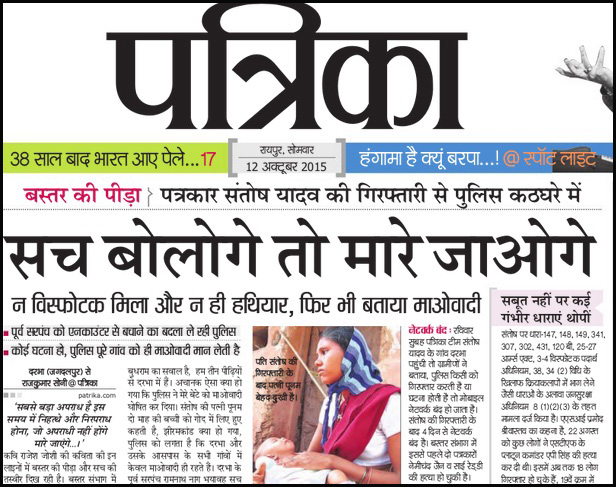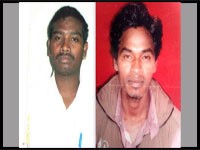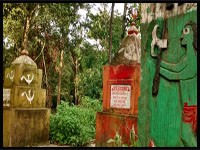Prove charges, Bastar scribes tell state govt
Video credit: Pavan Dahat, The Hindu
The recent arrests of Somaru Nag and Santosh Yadav, two young, rural reporters in the Bastar district of southern Chhattisgarh, on charges of supporting the Maoist rebels, has spurred the state’s journalists into demanding greater protection against police and Maoist excesses. Chitrangada Choudhury spoke to Bastar’s Kanker-based editor of Bhumkaal Samachaar, Kamal Shukla for an overview of the journalists’ demands and how they intend to mobilize and protest, against the backdrop of a decade-long, deadly conflict in the region.
The state’s journalists held a protest meeting on October 10 in the state capital of Raipur – how did that unfold?
The meeting was very successful – close to 300 journalists showed up. The hall was overflowing, and over 100 more had to wait outside. All the various journalist bodies in the state came together and attended, and we have collectively decided to form a Patrakaar Suraksha Kanoon Sanyukt Sangharsh Samiti (United Struggle Body for the Security of Journalists). We have formed an executive committee, with two journalist representatives from every district of the state to enable the body to take decisions on how to advance our interests.
After much discussion on the recent arrests, we decided to announce to the government that we are giving them one month to produce proof of Santosh Yadav and Somaru Nag being allied to the Maoists, and back with evidence the sections they have both been booked under. Or else, the police should release them. If that does not happen, we have decided that we will hold another protest in Jagdalpur after a month and court arrest under the Chhattisgarh Public Security Act, which has been used to book Santosh Yadav.
Just like the police did not inform either of the two journalists’ families, and arrested them impromptu, we also decided to take out an impromptu march to the Chief Minister’s house. This is the first time in the history of the state that journalists have broken security barriers, and reached the CM’s residence. We could not meet Raman Singh (the Chief Minister), but handed over a list of demands to his office, and the office of the Governor.
What are the other demands of the journalists?
We want the state to create conditions where reporters can work and travel freely, with independence, and without fear or harassment. The practice of fake arrests should stop. The state should consider repealing the Chhattisgarh Public Security Act, and certainly stop using it against reporters. Reporters also specifically named senior police official S.R.P.Kalluri, who has created an atmosphere of terror in the Bastar region, through all his postings as SP, DIG and then IG of Police. He has been constantly threatening reporters, or luring them with offers of contracts for public works in the region, and committing other illegal acts.
What about the role of the media organisations, and their conduct towards reporters, in particular rural stringers?
Through our discussion, it emerged that most of us feel that our organisations are responsible for the difficult conditions we find ourselves in. Our experience is that they use us when they need us, but when we find ourselves in trouble, they cut off ties with us. The organisations are yet to back our protest. Therefore we are asking the state to engage with media organisations to provide us with better work conditions. A specific demand is that the state should get media organisations to provide them with a list of all their employees, both reporters and others, and this should be updated every six months, so that no organisation can disassociate itself from one of its employees in a moment of crisis.
What other forms of help do the families of Somaru Nag and Santosh Yadav need?
Twelve reporters from Bastar have collected 5000 rupees for their aid so far. We have also decided to help in their legal defence, put forward any concerns the families express, and keep up the fight for them. Fortunately, the papers which employed them i.e. the Patrika and the Daily Chhattisgarh have admitted that Somaru and Santosh used to work for them. The media here has also started highlighting their arrests, including a front-page story today in the Patrika newspaper, which looks at how Santosh has been slapped with several serious charges under multiple acts, despite no evidence. But I must add that Navbharat, a newspaper for whom Santosh was a stringer, is yet to publish a single line on him, or acknowledge that he worked for them.

Rajasthan Patrika carries pix of Santosh Yadav's wife on Oct 12, 2015
Did your discussion cover the Maoists?
Yes, we feel that when we are out in the villages reporting, just as the police, and paramilitary forces harass us and constantly question us and demand proof of who we are and why we are going somewhere, the Maoists do the same in areas under their control, and where they say they have set up a government. In the name of conducting a ‘People’s War’, they interrogate us, and sometimes keep us in custody for 2-3 days. There have been instances where they have killed our colleagues on the grounds that they were police informers. Chhattisgarh’s journalists want an atmosphere where they can work freely and independently.
(Chitrangada Choudhury is an Orissa-based multimedia journalist and researcher, and a Fellow with the Open Society Institute - suarukh@gmail.com)








